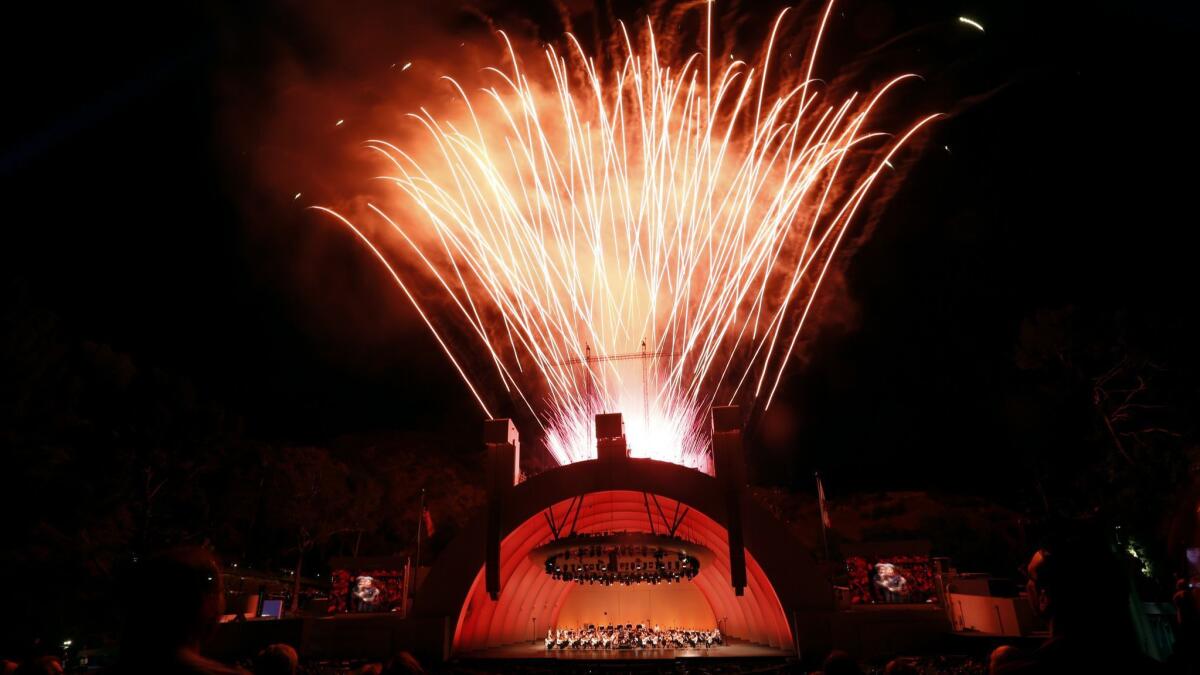Review: The Hollywood Bowl’s typically tacky Tchaikovsky Spectacular gets the Dudamel treatment

- Share via
More than any other Los Angeles Philharmonic music director, maybe more than any other conductor before, Gustavo Dudamel loves the Hollywood Bowl. And he probably loves Tchaikovsky — the favorite composer of his late mentor, José Antonio Abreu — the most, as well.
Even so, the Bowl’s annual Tchaikovsky Spectacular, which Dudamel led in an incomparably spectacular fashion Friday night (and repeated Saturday), is no time for such sergeants. It’s the fireworks that have made this an annual sellout sensation. The formula remains unchanged since Zubin Mehta led the first Tchaikovsky Spectacular in 1969. Stick to the most popular Tchaikovsky, then let loose the fireworks for the “1812 Overture,” replete with marching band.
I, on the other hand, hate the Tchaikovsky Spectacular, despite loving fireworks. It has always represented the worst of the Bowl. As Karen Monson wrote in these pages, reviewing the 1969 Spectacular: “Five airplanes … babies crying; people screaming somewhere in the hills … and one unidentified hooting object.”
The best way to deal with all that has been to play up the cheesy factor. At this late date, camp works best. Conductor and soloist aren’t what fill the seats, and this is one occasion where it is legal for the orchestra to use autopilot. But what if — just a hypothetical — someone tried to take it seriously?
For Dudamel that was no hypothetical. He followed the formula fairly closely with a program that, like that first one that Mehta gave, began with the soldierly “Marche Slave” and included the ever-chestnut Fantasy-Overture, “Romeo and Juliet.” Where Dudamel departed from the familiar was to replace another favorite, say Tchaikovsky’s First Piano Concerto, with the seldom-heard Shakespearean Fantasy-Overture, “Hamlet.”
With that, Dudamel had a Shakespeare theme, and his “soloists” were three actors introducing the fantasy-overtures with a few famous lines from the plays that the works evoke. This is something Dudamel has done twice before at Walt Disney Concert Hall with the L.A. Phil and the Simón Bolívar Symphony Orchestra of Venezuela. As on those earlier occasions, Kate Burton was the stage director.
Nice as the gesture was, classing up the Bowl with a little Shakespeare wasn’t really the point. Tchaikovsky was. “Marche Slave” begins as an ordinary funeral march, timpani and lower strings tolling four-four time. Yet somehow Dudamel found depth even in, especially in, those first four bars.
What that depth was proved hard to determine at first. But as the march progressed, as Dudamel penetrated into the soul of Hamlet and released the musical hormones of Romeo and Juliet, the something special became increasingly apparent. Every note mattered, nothing for Dudamel was extraneous.
The L.A. Phil may know this music well (if not “Hamlet” so much), but the quality of playing, and the character, was hard to believe with so little rehearsal and in a busy week that had included two other programs. The intensity did not, for a moment, let up. The amplification was turned up to the bold setting, which made every detail vivid (and had the power to augment every mishap). Close your eyes and you could imagine the brilliance of the Berlin Philharmonic.
Asia Kate Dillon, the “Billions” cast member who identifies as nonbinary, introduced “Hamlet” by giving a new, brilliant meaning to “To be, or not to be.” The roiling storminess of Tchaikovsky suddenly seemed relevant, however peculiar the inclusion of what sounds like a Russian folk song in the middle.
Unlike Dillon, who lithely liberated Hamlet’s unmoored melancholy, Anika Noni Rose and Ioan Gruffudd were both moored, gracelessly reading from scripts and trying to find their way around the stage at the same time. What’s all the more curious is the unusual credit in the program for a casting director. Surely such accomplished actors (Rose had been the Juliet in Dudamel’s 2011 Disney Hall concert) might have brushed up on their Shakespeare.
There was no credit for the fireworks, and they were glorious. This really does require preparation, since there is no rehearsal. But the synchronization with the music was mostly on and, if corny at times, corny in a way that brought a wide smile to one’s face.
Nor did Dudamel take the “1812” for granted. He might have been conducting Beethoven’s Ninth, such was the magnificence and grandeur of the performance, though not, necessarily the intent of a score commissioned by Tsar Alexander, a notorious bigot. The USC Trojan Marching Band entered for the final bit of Tchaikovskian triumph with the joyfulness of winning the Rose Bowl.
The Tchaikovsky Spectacular was never meant to represent the Hollywood Bowl at its best. Whatever you do, don’t tell Gustavo.
More to Read
The biggest entertainment stories
Get our big stories about Hollywood, film, television, music, arts, culture and more right in your inbox as soon as they publish.
You may occasionally receive promotional content from the Los Angeles Times.











